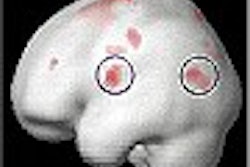CHICAGO - German researchers continue to champion MRI screening over conventional mammography for women who are at high risk for breast cancer, according to a presentation Monday at the American Society of Clinical Oncology meeting.
A major benefit of MR is that it avoids exposing these women -- who may be BRCA1 or BRCA2 carriers -- to ionizing radiation, which could increase the mutation of already compromised genomes, said lead investigator Dr. Christiane Kuhl from the University of Bonn.
In addition, MRI appears to be far more sensitive than conventional mammography or high-resolution sonography.
"MRI offered -- by far -- the highest sensitivity for diagnosing familial breast cancer, and at the same time had the lowest rate of unnecessary biopsies," said Kuhl, who is an associate professor of radiology and neuroradiology.
Kuhl’s group compared MRI with mammography and high-resolution breast ultrasound in a five-year study. The patient population consisted of 462 women who were at high risk of breast cancer because of BRCA genetic mutations or family history.
During the study period, 51 breast cancers were discovered in 45 women -- with all but 13 of them found by imaging. MRI offered the highest sensitivity -- 96.1%, compared with 42.8% for mammography and 47% for ultrasound, she reported. The positive predictive value was 56.9% for MRI, 38% for mammography, and 17.5% for ultrasound.
"Women with familial breast cancer are more susceptible to the mutagenic effects of the low-dose irradiation used for a mammogram," she said. "Together with the significantly earlier onset of screening, the lifetime x-ray dose in women at risk for familial breast cancer will be substantially higher than for women at average risk."
Commenting on the study was Dr. Mark Robson from Memorial Sloan-Kettering Cancer Center in New York City. In a previous ASCO talk, Robson’s group recommended against using MR screening for high-risk patients because of a lack of specificity. He pointed out the radiation risk from mammography, even in women with BRCA1 and BRCA2 mutations, "is theoretical."
Added Rebecca Garcia, Ph.D., vice president for health sciences for the Dallas-based Susan G. Komen Breast Cancer Foundation, "we think MRI is a promising emerging technology, especially for high-risk younger women who have dense breasts that often do not produce good images for mammography." But Garcia agreed with Robson that the true value of MR screening for high-risk women is still open to debate.
Kuhl agreed that breast MRI does require clinical expertise and special equipment in order to produce optimal results.
By Edward SusmanAuntMinnie.com contributing writer
June 3, 2003
Related Reading
MRI highly sensitive for breast cancer, but lacks needed specificity, June 3, 2003
High breast cancer risk may warrant MR screening rather than mammography, May 7, 2003
Tips and techniques make MRI feasible for breast centers, March 20, 2003
Copyright © 2003 AuntMinnie.com



















